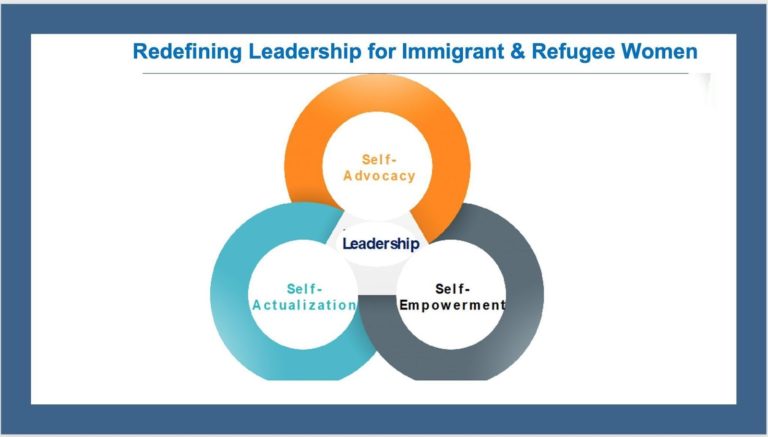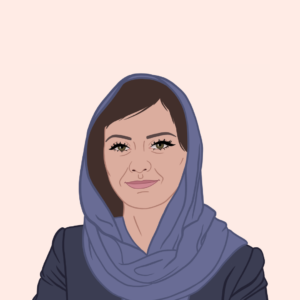2024…
Empowering approaches to build leadership for immigrant and refugee women.
Sara Asalya shares how her own experiences have helped guide her advocacy, and offers her advice.

By Sara Asalya
I have been reflecting a lot lately about my experiences in Canadian workplaces when I was a newcomer to Canada. Back then, I was not aware of my rights. I wanted to provide for my family, and I was told by my colleagues to never complain or speak up, otherwise I would be fired.
The more I know about worker’s rights and women’s struggles in accessing, remaining, and ascending in the workplace, the more I realize that what I experienced was employer exploitation, abuse of power, microaggression, racism, and micromanagement at its best. Being in a toxic workplace environment has impacted my self-esteem, confidence, and the ability to believe in myself, or to even think that I am fit to be in leadership roles — let alone how these experiences have impacted my mental, physical, and emotional wellbeing.
As a racialized visible Muslim and immigrant woman, I was made to feel that I don’t qualify to be a leader. I was made to feel that the system was never designed for me or for the people who looked like me. I was made to feel that no one will ever get my back or even champion me.
We are meant to feel different, that we don’t fit, we don’t belong, and we don’t have the skills or knowledge needed to really assume leadership roles. Our credentials are devalued, and we are often experiencing deskilling and underemployment.
It is shocking to me to learn that I was denied these rights because my employers knew well that I so badly needed the job that I would follow their commands and rules no matter what.
It is never ok for an employer to tell us how we are supposed to dress, carry out ourselves, behave in the workplace, or even what we should or shouldn’t talk about. It is ironic that many of these employers are now speaking EDI language, encouraging their employees to bring their whole self to the workplace, and to openly talk about their mental health. Now, all of the sudden, these employers are championing these causes when they denied me accommodations to observe Ramadan as a Muslim woman, or denied me a day off to attend to my family as an immigrant mother, or a mental health break to name a few.
It is shocking to me to learn that I was denied these rights because my employers knew well that I so badly needed the job that I would follow their commands and rules no matter what. It is also shocking to learn that my colleagues were granted extra days off to celebrate Christmas and Thanksgiving with their families, and that I was denied religious accommodations simply because I am a racialized Muslim woman and an immigrant who was afraid to speak up for herself, and who wasn’t aware of her rights in the workplace.
Now, I lead a program at Newcomer Women’s Services Toronto, called Sister2Sister. The program aims at building leadership capacity and civic engagement for multi-ethnic immigrant and refugee women of colour.
We take the sisters into a self-discovery journey where we talk all things identity exploration, and sense of belonging and purpose. We together build sisterhood and a safe space for them to share their own stories and learn how to break down barriers, overcome obstacles, and empower one another. We create pathways to advance their leadership, and provide a platform for them to construct, deconstruct, and negotiate multiple intersect identities as immigrant women of colour, while also talking about their experiences of exclusion, alienation, and marginalization in Canadian workplaces, and the compounded barriers they face to career advancement as well as challenges to assume leadership roles.
We talk about how as immigrant women of colour we can develop resilience, resistance, and acts of solidarity strategies to create our own safe spaces and sense of belonging. Based on my own experiences in Canadian workplaces, and based on a decade spent advocating for immigrant women’s rights and advancing their leadership, I designed a leadership model for the Sister2Sister program that consists of three pillars: self-advocacy, self-empowerment, and self-actualization:

Audre Lorde, the Black feminist writer and civil rights activists says, “If I don’t define myself, I would be crunched into other people’s fantasies for me and eaten alive.” We are redefining leadership for immigrant and refugee women because leadership for us is different. Immigrant women of colour bring a plethora of knowledge, skills, and rich culture to our workplaces. We are an untapped resource and deskilling us is an absolute waste of talent. We definitely don’t need to be trained on how to speak, communicate, dress, network with others, or on what is workplace etiquette. What we really need is a formula that allows us to speak up against violence, abuse, exploitation, and violations of any basic human rights. What we need is to learn about our rights, to be able to advocate for ourselves and our needs, and to simply be able to see ourselves in leadership roles — representation matters! I am still having difficulties visualizing myself in leadership roles when I don’t see people who look like me in politics, media rooms, board rooms, and in leadership roles.
In my capacity as the Founder and Executive Director of the Newcomer Students’ Association, I lead a national grassroots, membership-driven organization working at the intersection of migration, education, and social justice, and a platform committed to promoting inclusion and equity for post-secondary newcomer, immigrant, and refugee students. My team and I recently launched the Immigrant Women National Network (IWNN), a network led by and for immigrant and refugee women. The network aims to amplify the voices of immigrant and refugee women, advance their leadership, create transformative and empowering experiences, optimize their civic and political participation, and champion their rights. The network is looking into strategies to educate and engage employers in conversations and an ongoing dialogue about creating meaningful leadership opportunities for immigrant women — that allows them to thrive and be their authentic self. Employers shouldn’t have expectations that immigrant women will assimilate to other cultures or dilute their original identities or betray their own personal values to pleasure and follow Western culture norms.
The network also offers a diverse set of programming and initiatives that focus on building leadership capacity for immigrant women, starting with educating them about their human rights and providing anti-oppression and gender-based violence training. We are changing public narratives and discourses around immigrant women and debunking the myths and stereotypes about us not being capable or worthy of being in leadership roles.
Here are some recommendations for systemic change to support immigrant women’s leadership and career advancement in Canadian workplaces:
- Create safe spaces for immigrant women to talk about their needs and aspirations. Appreciate their diverse needs and lived experiences.
- Understand that immigrant women already have the knowledge, skills, and experience needed to be in leadership roles. You just need to believe in them, provide them the platform, and champion them.
- Develop culturally sensitive leadership development opportunities such as mentorship and sponsorship programs.
- Be inclusive when planning networking opportunities and spaces as many immigrant women can’t afford the luxury to participate in networking programs outside work hours or subscribe to additional non-work-related programs at their own cost.
- Be aware of how to apply an intersectional approach when creating advancement opportunities for immigrant women. Immigrant and refugee women are not a homogenous group.
- Don’t tokenize us in the name of equity, diversity, and inclusion. If you want to give us a seat on your decision-making table, you must provide us with tools and resources to thrive, and actively listen to and amplify our voices.
It is crucial for us to use empowering approaches when building leadership capacity for immigrant and refugee women. We need a paradigm shift when talking about settlement and integration of this segment. The conversation needs to be about economic empowerment and leadership for immigrant and refugee women, rather than short-term settlement solutions that limit the potential of these women. Here is an opportunity for us to reimagine what economic empowerment looks like for immigrant and refugee women.
Empowering Approaches to Building Leadership for immigrant and Refugee Women
- Invest in immigrant and refugee women talent.
- Focus on building and advancing their leadership development.
- Promote their mental wellbeing in the workplace.
- Prioritize long-term integration, advancement, and inclusion strategies for this segment.
- Operate from an-anti oppressive framework and use a strength-based approach when working with these women.
- Build their confidence, resiliency, and self-authorship.
- Create safe, brave, and empowering spaces for them to share their stories and lived experiences.
- Make them experts in their own issues, needs and experiences.
- Centre their voices by intentionally engaging them in decision-making processes.
There are so many strategies and opportunities for employers and workplaces to support and promote immigrant women and advance their leadership. Jessica Ketwaroo-Green reminds us that we first need to understand systemic oppressions and structural and institutional inequalities that continue to marginalize us and make us vulnerable to exploitation, deskilling, and underemployment. Systems of oppression continue to fail and exclude us, and we continue to be largely not represented in these spaces. My hope is that this action-oriented article with strategies for systemic change will be a starting point in our continued effort to create leadership opportunities for immigrant and refugee women.

Sara Asalya
A Palestinian immigrant, award-winning leader and human rights advocate. Sara has a long track record of developing and managing programs targeting immigrant and refugee women internationally and in Canada, with a particular focus on building and advancing their leadership and economic empowerment. Sara was named one of Canada’s Top 25 Canadian Immigrants and Top 25 Women of Influence. From promoting civic engagement to empowering women, Sara works to mobilize, activate and galvanize immigrant communities to take action for social change. Sara is the Founder and Executive Director of The Newcomer Students’ Association, and the Senior Manager of Programs and Strategic Initiatives at Newcomer Women’s Services Toronto. You can connect with Sara via Linkedin and Twitter.

Sara Asalya
A Palestinian immigrant, award-winning leader and human rights advocate. Sara has a long track record of developing and managing programs targeting immigrant and refugee women internationally and in Canada, with a particular focus on building and advancing their leadership and economic empowerment. Sara was named one of Canada’s Top 25 Canadian Immigrants and Top 25 Women of Influence. From promoting civic engagement to empowering women, Sara works to mobilize, activate and galvanize immigrant communities to take action for social change. Sara is the Founder and Executive Director of The Newcomer Students’ Association, and the Senior Manager of Programs and Strategic Initiatives at Newcomer Women’s Services Toronto. You can connect with Sara via Linkedin and Twitter.
2024…
Gallery: 2024 RBC Canadian Women Entrepreneur Awards Program
Eva…
Meet Eva Hartling, Founder of The Brand is Female: Empowering Women and Celebrated for Her Impact on Women in Leadership
TORONTO,…
Twenty-One Remarkable Women Entrepreneurs Named 2024 RBC Canadian Women Entrepreneur Awards Finalists
By…
Sponsorship, Strategy, and Success: How this Scotiabank Executive Champions Career Advancement Through Advocacy
By…

